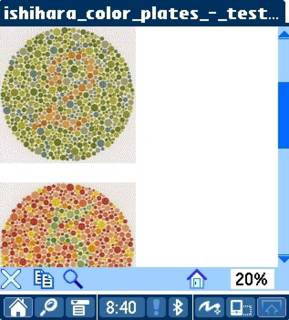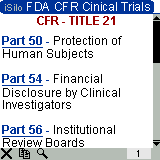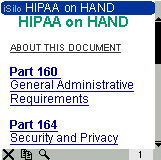Digestive System Anatomy Flash Cards
Anatomy students can turn to
Medicalwizards for help. They have a bunch of Anatomy Flash Cards. They have recently released
Digestive System Anatomy Flash Cards (Bryan Edwards) 1.0
 Application Description: Application Description:
The Digestive System Flash Cards product uses the time tested content and images from BryanEdwards.com and displays the necessary images to demonstrate the digestive system. This PDA version starts by examining the elementary canal, then leads to the gastrointestinal tract, and finishes with the accessory structures. Substantial text content detailing each image, and a quiz (?) section has been added to aid as a learning tool.
Whether an attending physician using this product to demonstrate anatomical terms to a patient, a medical, dental or nursing student, or undergraduate anatomy student; this product will exceed your expectations and needs. |
The other Flash cards in the
Medicalwizards library of PDA software include
•Netter's Anatomy Flash Cards
•Cardiovascular Anatomy Flash Cards (Bryan Edwards)
•Urinary Anatomy Flash Cards (Bryan Edwards)
•Bones
•Nervous System Anatomy Flash Cards (Bryan Edwards)
•Head & Neck Anatomy Flash Cards (Bryan Edwards)
•Reproductive Anatomy Flash Cards (Bryan Edwards)
•Endocrine Anatomy Flash Cards (Bryan Edwards)
•Muscles Anatomy Flash Cards (Bryan Edwards)
•Respiratory Anatomy Flash Cards (Bryan Edwards)
•Integument Anatomy Flash Cards (Bryan Edwards)
Both Palm and PPC versions are available. All you need is some $$$ and a LARGE SD card for storing all these fantastic study aids. I wish I had them when I was a medical student!
 Application Description:
Application Description:
 Taber's Cyclopedic Medical Dictionary, published by F.A. Davis, defines more terms than any other health science dictionary. With approximately 56,000 terms in all -- including more than 2,200 new terms -- Taber's 19th is the most comprehensive health science dictionary available today.
Taber's Cyclopedic Medical Dictionary, published by F.A. Davis, defines more terms than any other health science dictionary. With approximately 56,000 terms in all -- including more than 2,200 new terms -- Taber's 19th is the most comprehensive health science dictionary available today.

 This user-friendly reference assists in the initial evaluation and treatment of the most frequently encountered problems in emergency medicine, both common and potentially life-threatening. Get instant access to 97 of the most common or important emergency medicine problems experienced by adult, pediatric, and geriatric populations. Each section includes the presenting problem, immediate questions, differential diagnosis, laboratory and diagnostic data, and treatment plan. Additional sections such as toxicologic emergencies, laboratory diagnosis, procedures, blood component therapy, and commonly used medications are also included and enhance the reference value as a single-source reference.
This user-friendly reference assists in the initial evaluation and treatment of the most frequently encountered problems in emergency medicine, both common and potentially life-threatening. Get instant access to 97 of the most common or important emergency medicine problems experienced by adult, pediatric, and geriatric populations. Each section includes the presenting problem, immediate questions, differential diagnosis, laboratory and diagnostic data, and treatment plan. Additional sections such as toxicologic emergencies, laboratory diagnosis, procedures, blood component therapy, and commonly used medications are also included and enhance the reference value as a single-source reference. How do you manage your Patient contacts? Do you use a specialised patient tracking app? I personally find these cumbersome. My most used program to track patients is Agendus (formerly known as Action Names) and as a long time registered user of Agendus, I can say it has served my needs very well. Agendus suits people (like doctors) whose meetings are very Contact-centric. I find it useful because you can link the Meeting event to the Contact and when you write meeting notes, these can be Logged into the Contact's Note field. The latest version of Agendus (v 8.0) has just been released by
How do you manage your Patient contacts? Do you use a specialised patient tracking app? I personally find these cumbersome. My most used program to track patients is Agendus (formerly known as Action Names) and as a long time registered user of Agendus, I can say it has served my needs very well. Agendus suits people (like doctors) whose meetings are very Contact-centric. I find it useful because you can link the Meeting event to the Contact and when you write meeting notes, these can be Logged into the Contact's Note field. The latest version of Agendus (v 8.0) has just been released by  Description:
Description:

 Application Description:
Application Description:
 Davis's Drug Guide, the best-selling drug reference produced by F.A. Davis, is now delivered via Unbound Medicine's award-winning handheld platform. This comprehensive and up-to-date resource provides need-to-know information on thousand of brand name and generic drugs.
Davis's Drug Guide, the best-selling drug reference produced by F.A. Davis, is now delivered via Unbound Medicine's award-winning handheld platform. This comprehensive and up-to-date resource provides need-to-know information on thousand of brand name and generic drugs.
 Completely revised and updated for 2004, this practical handbook is an up-to-date guide to all aspects of cancer chemotherapy. This reference provides a comprehensive, easy to use Index of over 100 drugs -- both on- and off-label -- commonly used in cancer treatment. All entries have been updated meticulously as necessary, and this new edition includes five new agents (recently or about to be FDA approved). A section on Common Chemotherapy Regimens provides a quick reference to management of specific cancers, arranged alphabetically. A new section on Principles of Chemotherapy offers a concise update and overview of the field.
Completely revised and updated for 2004, this practical handbook is an up-to-date guide to all aspects of cancer chemotherapy. This reference provides a comprehensive, easy to use Index of over 100 drugs -- both on- and off-label -- commonly used in cancer treatment. All entries have been updated meticulously as necessary, and this new edition includes five new agents (recently or about to be FDA approved). A section on Common Chemotherapy Regimens provides a quick reference to management of specific cancers, arranged alphabetically. A new section on Principles of Chemotherapy offers a concise update and overview of the field. 


 Now available in PDA format, this practical guide helps clinicians streamline pediatric diagnosis with a comprehensive, integrated, logical approach to analysis of symptoms and signs. Dr. Bellet helps practitioners answer three basic questions: What are the diagnostic possibilities? How can I diagnose each one? What is my approach to this problem?
Now available in PDA format, this practical guide helps clinicians streamline pediatric diagnosis with a comprehensive, integrated, logical approach to analysis of symptoms and signs. Dr. Bellet helps practitioners answer three basic questions: What are the diagnostic possibilities? How can I diagnose each one? What is my approach to this problem?
 A volume in the well-known Saunders' Pocket Essentials series, the New Edition of this popular handbook is the ideal reference for students throughout their clinical studies. It provides a comprehensive account of general medical problems while facilitating the learning process. This reference includes medical emergency information, offering more information on contraindications; problem-oriented questions with answers; information on practical procedures; a dictionary of terms; abbreviations and normal values; differential diagnosis tables and more.
A volume in the well-known Saunders' Pocket Essentials series, the New Edition of this popular handbook is the ideal reference for students throughout their clinical studies. It provides a comprehensive account of general medical problems while facilitating the learning process. This reference includes medical emergency information, offering more information on contraindications; problem-oriented questions with answers; information on practical procedures; a dictionary of terms; abbreviations and normal values; differential diagnosis tables and more. Application Description:
Application Description:


